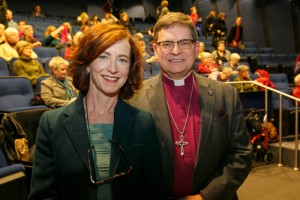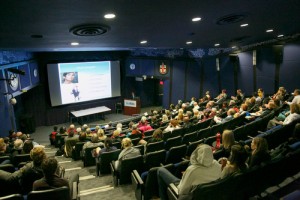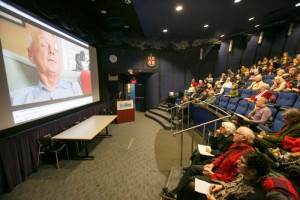
By Stuart Mann
In a thought-provoking address at SickKids hospital in Toronto on March 12, Archbishop Colin Johnson raised a number of questions about physician assisted death, an issue that has gained national prominence since the Supreme Court ruling last month.
Archbishop Johnson was speaking at the Richard Gidney Lecture on Faith and Medicine, an annual forum that examines current issues of medicine and faith. He was joined by Maureen Taylor, a clinical assistant professor in the Physician Assistant Education Program at McMaster University.
Although not personally in favour of physician assisted death, Archbishop Johnson said the issue is complex and Canadians must guard against taking rigid positions in the debate. “It is not a subject on which everyone will agree,” he said. “This will not be resolved by assembling all the facts, assessing the data and coming to an unassailable professional conclusion – although there are many who would want precisely that.”
He said in such complex matters, the manner in which the questions are framed are more important in determining a way forward than providing quick fixes. “It seems to me that there will be multiple ways forward, not one or two,” he said. “Dealing with the transition between life and death, the mystery of a person’s being and final journey, is not simple; it is a holy moment. And it is a winding path.”
He said Canadians “desperately” need to have a conversation about death as a natural part of life. “How many of you have a will? A power of attorney for personal care? How many of you have had a conversation with your own family about your wishes as you age and as you approach death?”
In raising his questions about physician assisted death, he said he was not trying to say it was wrong in every case, but rather to approach it from another perspective.
He noted there were alternatives to physician assisted death, such as improved home-based palliative care, which studies have shown is the least expensive and the most preferred form of care by patients.
“Why are we not advocating for appropriate resources to support what would serve a much larger component of our population? Individuals already have and exercise the right to refuse treatment. Would more do so in terminal cases if they had the support through the process of dying at the early as well as the imminent stages of dying? Would they choose to do so earlier if they had frank and supportive discussions of the realities of their prognosis sooner?”
He said society needs to recognize and support the role of the primary caregivers and family as well as the close community as they “support, grow, learn, share, grieve and are transformed through the experience of accompanying a person journeying toward death.”
He asked what constitutes a good death. “Is a good death a death freed of all suffering? We are a society that abhors suffering and prizes instant gratification. Is physician assisted death a technological quick fix to relieve anxious and aging boomers who are used to being in control of everything? I’m speaking as one of that demographic.”
In asking his questions, he stressed that his comments were not directed at every instance of physician assisted death. “We do not have a right to ask or tell others that they must suffer for the sake of our own conscience or beliefs or world view. But what I do say – and this is a central part of Christian faith – is that while suffering is not to be gratuitously embraced, neither is it to be avoided as a straightforward evil at all costs. Suffering is not merely to be endured; it needs to be redeemed, to be given some meaning or purpose if it is to have any value. So a parent may be willing to endure privations on behalf of the betterment of a child. Some will sacrifice themselves for the welfare of another, even a stranger. Some suffering can break open the human heart to the deep pain of our world and grow into true compassion that is expansive and not constricting. At the heart of the Christian faith is the suffering of Jesus on the cross that we believe leads to the redemption of the world and opens a new relationship with God.

“Let’s remember that pain is an important indicator of deeper trouble, and masking it prematurely can lead to more serious issues: look at what leprosy does when it deadens nerves, turning off the body’s warning systems that protect the extremities. The psychological or spiritual pain of looking at a broken world propels some to engage in reforming that world.
“Suffering that is completely meaningless can easily become unendurable. And suffering that goes beyond a certain degree – and that point varies from person to person and situation to situation – can become destructively all-consuming. I have unfortunately witnessed nurses who are proud that they have been able to withhold narcotic pain relief from a pain-tortured individual who is going to be dead in a matter of days because he might become addicted. But I have also seen patients ‘titrated to snow’ without ever being consulted, frustrating their last chances to engage intelligibly with their loved ones. Before we simply anesthetize pain, we need to ask, ‘What is actually going on here? Whose pain is being anesthetized?”
He said a person is more than a machine. “We all know that, but is that what some of our medical interventions actually reflect? All too often, I observe mechanics, engineers and technicians at work rather than healers. I come from a faith tradition that has at its core a very high value on matter, the stuff of life, the physicality of the world. The Christian doctrines of creation and incarnation witness to that. Life is a sacred gift. The body and what you do with it is important. We are stewards and trustees of our life. In our tradition, the individual is deeply valued but so is the community. Health is about wholeness, the whole person – body, soul, spirit, and the whole community. Death is an integral part of that. Death is not always a defeat; sometimes it is in the long process of dying that the final and only moment of healing comes – healing of relationships, of memories, coming to terms with lost dreams and finding new hope; perhaps the release from the limitations or the pain that may have spanned the better part of a life-time.
“There is a time for death. Who decides when that will be? What are the parameters of that decision or set of decisions? Death is a deeply personal issue but not solely personal. Who else is involved? We live in a society where individual autonomy is a highly cherished and guarded value. The ability to make choices is very important. But we need to balance that with a recognition that individuals find their lives lived with others and that we find our fulfilment not in isolation but in relationships, in community. Christians believe that the foundation of this reality is in God. ‘I am the boss of myself,’ is the protest of a petulant three-year-old. Maturity involves recognizing that this is only partially true and then only some of the time.
“Our moral decisions, if they are not simply self-centred and selfish, are made in reference to a wider public context and recognize that our choices have impact on others. When we are speaking of physician assisted death, there are various publics being addressed – a whole array of stakeholders: the person, the families and friends, the ethicists and theologians, the physicians, nurses and technicians, the chaplains, social workers and caregivers; fellow citizens (I use this word rather than taxpayers because it conveys a wider range of responsibilities and obligations, as well as benefits). All of these are affected by the decision to seek physician assisted death, and many will have conflicting values. Policies developed both to permit it and to safeguard others’ rights need to take this into account.”
He questioned whether the choices currently made for medical care are healthy. “I’m going to be somewhat provocative here to make a point. On one side we spend enormous amounts of resources – time, money, expertise, technology, space – to extend lives well beyond what is normal. We are reluctant to face the inevitability of death and we postpone the discussion of alternative measures until well into a treatment process, when it is often clear much earlier both to the professional and not infrequently to the patient that the prognosis is terminal. We have used technology to prolong life, sometimes with great benefit, sometimes grotesquely. Are we then turning to a new technology to shut it down and fix the problem?
“On the other hand, we spend a great deal of energy worrying about – but not devoting too many resources – to preventing young people from committing suicide. I am the bishop of a northern diocese where suicide is epidemic, where young and old are in the midst of deep despair and, to them, unendurable suffering, with little hope of that changing. You will note that the Supreme Court decision specifically does not limit its provisions to the terminally ill. What criteria do we develop that will differentiate between the conscious decision (consent) of a terminally ill adult to ask for physician assisted death to end their life a bit sooner because of their unremitting and unendurable pain, and this group? Or are they the actually the same, except that the latter can access their own means of dying without professional help?”
Archbishop Johnson said he does not agree with those who say that physician assisted death is a “slippery slope” that will lead to abuses, but he cautioned against putting too much trust in governments to make the right decisions on the issue. “Those who are concerned about the so-called slippery-slope effects of more permissive legislation are sometimes dismissed as fear-mongers. Indeed, some of them are, and some of their claims are outrageous! I am a good, card-carrying institutional-supporting liberal, you may have noticed. But I am not quite so sanguine about trusting our government or our society to instinctively do the right thing in such complicated matters. We do not have to look abroad to find examples. The history of the treatment of the First Nations peoples, the confiscation of property and internment of Japanese and German Canadians, the oppression of Chinese immigrant labourers, the Alberta eugenics policy for the mentally challenged, the ongoing serious and chronic abuse of the vulnerable elderly today should give us pause.
“Already we know that some, perhaps many, patients make a medical treatment decision based on the impact it will have on their family, not on fact-based scientific data. How will that impact ‘un-coerced’ decisions about physician assisted death? How will the rationing of health care dollars put pressure on critical decisions on end-of-life issues? It already does, in the way we inadequately allocate funds to home care, spiritual care, chronic care, palliative care and mental health services. The cult of efficiency is a business model that does not take into account the ways of the heart and soul or the unpredictable paths of the processes of life and death. It cannot be the primary way decisions in health care need to be formulated.
“Personally, I am not a proponent of physician assisted death. I recognize that palliative care will not work in every situation, however, and I would not close off all avenues of physician assisted deaths. But I think it should be exceptionally limited and we should spend much more energy and resources on alternatives that will impact far more lives and far more deaths. And I have real concerns about how we have come to focus on this without having the much more important discussion about death itself, especially how we have professionalized and sanitized death so that is no longer a normal stage of life.”
He finished by quoting Metropolitan Anthony of Sourozh of the Eastern Orthodox Church: “The injunction ‘be mindful of death’ is not a call to live with a sense of terror in the constant awareness that death is to overtake us. It seems rather: ‘Be aware of the fact that what you are saying now, doing now, hearing, enduring or receiving now may be the last event or experience of your present life.’ In which case it must be a crowning, not a defeat; a summit, not a trough. If only we realized whenever confronted with a person that this might be the last moment either of his life or of ours, we would be much more intense, much more attentive to the words we speak and the things we do. Only awareness of death will give life this immediacy and depth, will bring life to life, will make it so intense that its totality is summed up in the present moment. All life is at every moment an ultimate act.” (From “Preparation for Death” in the book The Time and The Spirit.)

Ms. Taylor spoke about the death of her husband, Dr. Donald Low, the microbiologist who is credited with guiding Toronto through the 2003 SARS crisis. Her presentation included a short video featuring Dr. Low a week before his death in 2013.
In the video, Dr. Low makes a direct plea to opponents of physician assisted death by imploring them to reconsider. “I wish they could live in my body for 24 hours and I think they would change that opinion,” he said. “I’m just frustrated not to be able to have control of my own life. Not being able to have the decision for myself when enough is enough.”
Ms. Taylor, a former medical reporter for the CBC, praised the Supreme Court ruling which gives Canadians the right to physician assisted death. She said an overwhelming majority of Canadians support physician assisted death in certain cases.
“The slippery slope argument is a fallacy,” she said, citing studies from Oregon, which allows assisted death under certain circumstances.